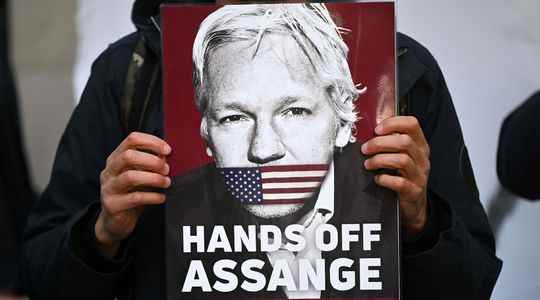Julian Assange’s legal saga may have moved closer to its epilogue. The founder of WikiLeaks is ever closer to extradition to the United States, after the order issued by the London court on Wednesday. It is now up to British Home Secretary Priti Patel to approve and seal, or not, the fate of the whistleblower, perceived as a hero of press freedom by some, as a traitor to the nation by others. This situation opens a debate on the fate of political prisoners in the United Kingdom. The founder of WikiLeaks has been detained for almost three years in the high security prison of Belmarsh, near London. A refugee in the Ecuadorian embassy in the English capital in 2012 while he was wanted by the American authorities, Julian Assange was arrested by British police in April 2019 and imprisoned.
Prosecuted in particular under legislation against espionage, he faces one hundred and seventy-five years in prison in the United States, where his chances of escaping a trial are dwindling. After having multiplied the appeals before the civil and criminal courts of the United Kingdom, the 50-year-old man saw all his procedures rejected.
It was an administrative hearing like there are hundreds of others, every day, in British judicial life. This one, however, had a particular echo. Magistrate Paul Goldspring’s words were scrutinized. During the short hearing reserved for the fate of Julian Assange’s extradition, he quickly dashed the whistleblower’s hopes: “Put simply, I am required to send your case to the Minister of State for decision” , the magistrate told a Julian Assange who followed the proceedings via video link.
On March 14, he had seen one of his last hopes of avoiding his extradition disappear, with the refusal of the British Supreme Court to examine his appeal. An appeal to the High Court, with suspensive value, is one of the only avenues that now remains open to its lawyers. Without appeal, he will be extradited within 28 days of the Minister’s decision.
The United States is suing the founder of WikiLeaks for espionage after the publication of nearly 700,000 confidential documents relating to American military activities in Iraq and Afghanistan. Among them, for example, a video showing civilians killed by fire from an American combat helicopter in Iraq in July 2007, including two journalists from the Reuters agency. The Australian, whose country of origin does not wish to oppose the extradition request made by the United States, is accused under legislation against espionage. He faces 175 years in prison.
Note that the whistleblower was, for a time, prosecuted by an arrest warrant issued by Sweden for alleged rape and assault, which dates back to August 2010. The complaint for sexual assault was dropped in 2015 due to prescription . Same fate, in 2019, for the second charge, for lack of evidence.
- Why is this important?
On Wednesday, outside the London court, a hundred supporters of Julian Assange had gathered, brandishing signs “Do not extradite Assange. Journalism is not a crime” or “Let the freedom of the press rest in peace”. If the potential extradition of Julian Assange leads to this kind of mobilization, it is because the case of the American embodies a fight for the freedom of the press and journalism. “Yes [Julian Assange] is extradited to the United States, journalists around the world will have to look over their shoulders if they publish information harmful to American interests”, immediately reacted Simon Crowther, of the human rights organization Amnesty International, on Twitter.
Beyond the question of the symbol, it is also the conditions of detention of the founder of WikiLeaks which have aroused the turmoil of part of international opinion. The UN rapporteur on torture, Niels Melzer, has repeatedly denounced the treatment inflicted on the whistleblower. Human rights associations are protesting against the horizon that is emerging for Julian Assange.
